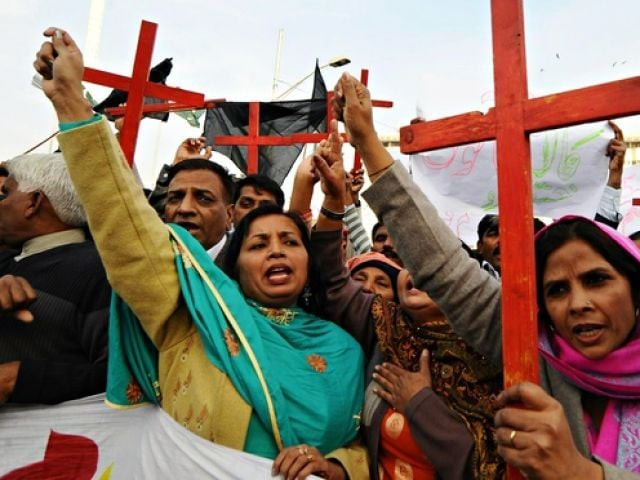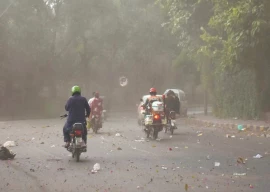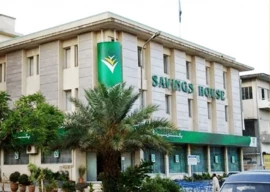
The three compounds, known as Gol Godown, Sanda Godown and Tail Godown, are located in the city’s Kohati area near Kohati church. Before partition, the Tail Godown was used to stock oil for lighting the street lanterns while the Sanda Godown was a stable for horses and buffaloes.
“This one-room quarter was allotted to my grandfather, who was a class-four worker at Municipal Corporation and after him my father lived here and now this quarter is home to me and my children as well,” said 66-year-old Andrews Ghulam Masih, a resident of Gol Godown.
“We have spent our entire life here in this suffocated environment, hoping that government would grant a better place to us some day,” said Andrews, who also retired as a class-four employee of the corporation.
Another elder of the colony, William Bhatti, who is a retired employee of the sessions court told The Express Tribune that the previous K-P government provided a piece of land to the Christians of the city’s Lahori Gate area and shifted them to the Kachra Colony near Ring Road.
“But the [present] government has apparently forgotten us,” he said.
Tail Godown, which is a home to 52 families stretches over around 3 kanal of land; the Sanda Godown spreads over 2 kanal with 35 families living there in small quarters. The Gol Godown spreads over only 1.5 kanal and is inhabited by 23 families.
Each family, roughly comprising 4-5 members, spends their entire lives in one-room quarters. There are also some houses in these godowns but in each of these residences, three to four families inhabit due to lack of proper and cheap housing facility in the city.
Their suffocated environment and clogged sewage make the colonies a home to flies, mosquitoes and different diseases.
Rukhsana Saleem, a resident of Tail Godown, told The Express Tribune that “as a people living in closed dingy compartments with no system for ventilation, the residents of the godowns, particularly children, tend to be easy victims of dangerous diseases.”
Saleem, who is a nurse by profession, said the government does not even bother to spray the anti-dengue spray in the compounds even when the disease becomes endemic.
“If the government builds a new colony for Christians, we and our coming generation will be able to live a better life but we are a forgotten segment of the society,” she added.
Sources in Auqaf and Minorities Affair Department told The Express Tribune that no scheme has been planned in the current Annual Development Programme (ADP) to provide better residences to these poor families of the minority group.
Commenting on the issue, the K-P Chief Minister’s Coordinator on Minorities Affairs Ravi Kumar said: “We have tried to build flats on different missionaries’ plots but the people of the missionaries are the main hurdles.”
He said missionaries have their plots near churches but they do not allow the government to build residential apartments for their poor communities. “They go to court for stay order when we ask them to give these pieces of land which are already donated for the poor,” he said.
Kumar said the elected representatives of minorities also do not raise their voice for the rights of their people, adding that he had no authority as he was not an elected representative in the provincial assembly. “I cannot use the budget until I go to the house as a member,” he added.
Published in The Express Tribune, December 25th, 2016.











COMMENTS
Comments are moderated and generally will be posted if they are on-topic and not abusive.
For more information, please see our Comments FAQ